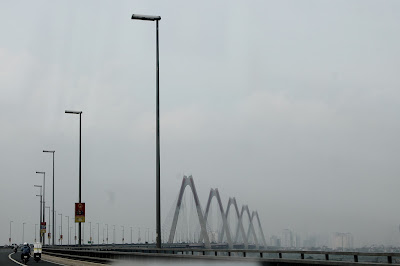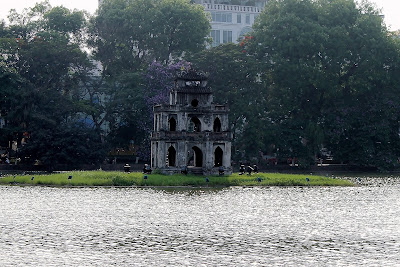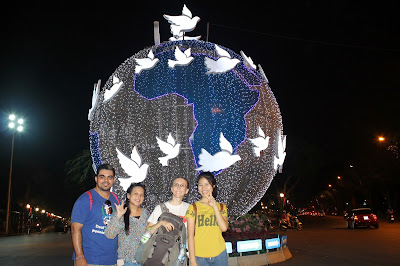While not formally a part of my 'ministry' as a Maryknoll Lay Missioner, my recent trip to Vietnam was a good reminder that we are all called to minster to one another regardless of where we are. And, sometimes that can mean taking people an a trip. Last month, thanks to some Cambodian holidays, I had a
chance to visit Saigon, Hanoi, and Halong Bay with three of my
colleagues. Over a year ago, my
former boss said, "You should consider getting together a group of
staff to go traveling because many will not go without a guide."
Due
to my love of planning travel adventures and inability to say no, I decided I might as well be the Mama Duck for a group of wanderlust souls. The group ended up being smaller than we had planned, but we had a blast!
Saigon
On our first night in town, I got to have a huge bowl of Pho!
Normally, this uses a meat broth and thus is not vegetarian friendly
but I was thrilled to find a vegetarian variety. It also just so
happened to be Ho Chi Minh's 130
th birthday, so we
wandered into a large performance honoring him. It was interesting
to experience. Due to some misinformation, we ended up missing the
water puppet show we hoped to attend so instead had our own adventure
in the park.
Our second day was all about history. I have to admit this is one
of the first times I have been to a museum at which the USA is not
the good guy. The War Remnants Museum was fascinating and, of
course, a wee bit depressing. My two Khmer colleagues knew little to
nothing of the war so were really surprised by some of what they saw.
Though, I think interpreting things like dioxin and agent orange to
Cambodian Sign Language may have meant some information was lost in
translation. They say you must understand a meaning to interpret
well, so the odds were against my interpreting as I will never
understand war.

In the afternoon, we continued our historical adventures to the Cu
Chi tunnels. They are a network of underground passageways that were
used by the North Vietnamese again the South Vietnamese and
Americans. The people originally used them as a place to hide when
the military came to take away men for forced recruitment but they
later became a place where people would live (complete with
kitchens). The people also used them to protect their land, building
all kinds of boobie traps with natural materials. At some point
during the war, the American troops brought over dogs to try to sniff
out the tunnels, as the entrances were easily camouflaged. The
people quickly learned that if they put the urine of American
soldiers, peppers, or other herbs on the entrance to the tunnels, the
dogs would not be able to detect them. Apparently, the urine of the
Americans was ok, so the dogs would just move on. The tunnels were
also incredibly narrow because the Vietnamese were very small and
were also starving so they didn't need the tunnels to be big. The Australians in particular had a whole recruitment
movement for slight-built men to join the army and go to Vietnam
because they would fit in the tunnels. We had an opportunity to go
into the tunnels (we all managed to complete about 70 meters, not the
full 170 meters).

It was a little cramped and these tunnels had even
been expanded to fit larger people. I was flattered at one point
when a tourist told me she wished she understood whatever sign
language I was using because she couldn't understand the English of
the tour guide but saw that I did. It was overall a fascinating
experience.
After our day of war history, in Saigon, we packed our bags to fly to Hanoi. I realized, once we arrived in Saigon that I had taken something for granted: All travelers know the size restrictions for liquids on planes. I told my co-workers, you need the small bottles to take on the plane. To them, small sized meant the 150-300ml bottles instead of the huge family sized bottles. In an attempt to save their soaps, we searched the markets high and low for travel bottles. When none could be found, creativity kicked in.
And, we all had to drink a lot of yogurt...
Hanoi
Hanoi's winding, maze-like old district was an absolutely perfect location. On our first day there, we had scheduled a free walking tour. These tours are led by high school and college students that are studying English. They have basic knowledge about different places in a certain area and also are thrilled to have an opportunity to practice English with a foreigner. We had an opportunity to see some old temples, the market, try a plum of sorts, and visit the turtle lake. I learned later that legend has it at one point a soldier threw his sword into the lake because he had given up all hope (there was a Romeo and Juliet type situation and an invasion that led to his dismal spirits). A turtle allegedly took the sword in his mouth and returned it to the owner as a sign that all was not lost. The turtle apparently just died recently. The park surrounding the lake is AMAZING!.
Among the amazing sights there, we found this guy...
We didn't realize that in addition to being in Vietnam for Ho Chi Minh's birthday and elections, we matched our travel to President Obama and Secretary of State Kerry's Vietnam visit. We didn't see the President but seeing Secretary Kerry was pretty cool. After living in DC, I have to admit I was amazed at how low security levels were. Our young tour guide, who was with us, was thrilled to know she had seen someone famous though a little disappointed it wasn't Obama because apparently she is a fan of his.
The free walking tour was such a great way to get a more personal feel for the city. Our young guide, on the right, was very sweet and eager to share about the sights and sounds of Vietnam, as well as her life experiences. We would highly recommend doing such a tour if you find yourself in Hanoi.
Another high point of Hanoi, which doesn't seem to be on the mainstream tourist circuit, is Lotte Tower (pun intended). Coming from Cambodia, this may have been the most anticipated activity for my colleagues. I don't think my Khmer colleagues had been in a building much over ten stories.
65-stories with a glass observation deck was a bit mind blowing.
I had been to something similar to this in Shanghai, though that was 100 floors I believe (shout out to my GEB Students), but standing on glass that high up in the air takes a bit of mental pep-talk time.
"That is really high"
"You have to do this because other people will follow your lead."
"What if the glass breaks and I fall 65 floors to my death?"
"I think I may wet myself!"
Once you get over that initial fear and get out on the glass. It is actually fun to take crazy pictures. Our group definitely spent at least one hour goofing around up in the sky. There was no one else in the entire observation area most of the time we were there.
Love doing my crazy balance poses anywhere possible :)
Halong Bay
Due to our shortage of time, we took a very quick day trip to Halong Bay (around 8-9 hours in van roundtrip). We saw the fighting/kissing chickens, though we didn't particularly see the resemblance to chickens... Just being out among the rock formations, on the water, surrounded by nature... and tourists... was refreshing. Two of my colleagues got to kayak for the first time in their lives. It was just a quick paddle in a boat that didn't really seem sea-worthy, but definitely nostalgic for me and exciting for the others.
My favorite part was definitely the visit to the caves. I am sorry the photos do not do them justice, but it was just mind boggling to see what nature had created. Many of the rock formations resembling ice cream likely also contributed to my love of the space...
And, this just felt like it should be in Lord of the Rings...
Our short trip was definitely just the minimum of this amazing country but I am so glad I had this opportunity to get to know Vietnam and my colleagues a wee bit better. It also reminded me how much I love leading and planning trips like this. So, if you ever need a trip planned, give me a shout :)




















































